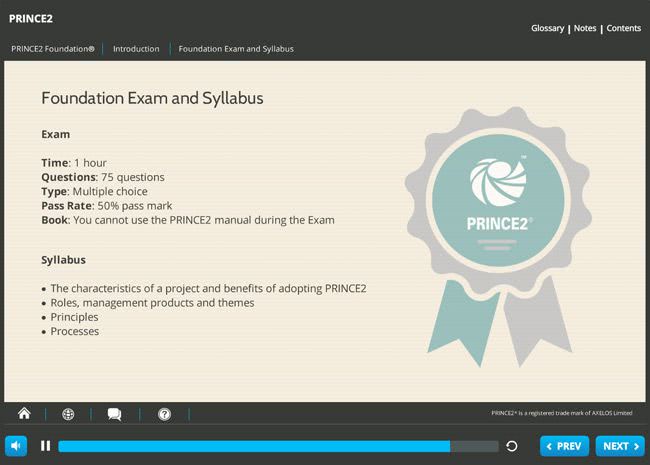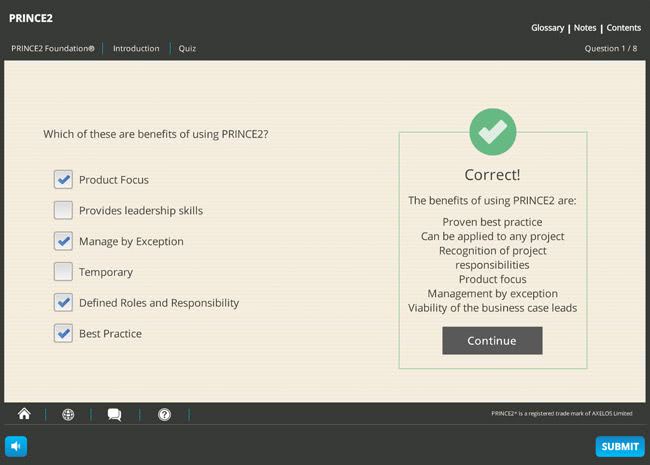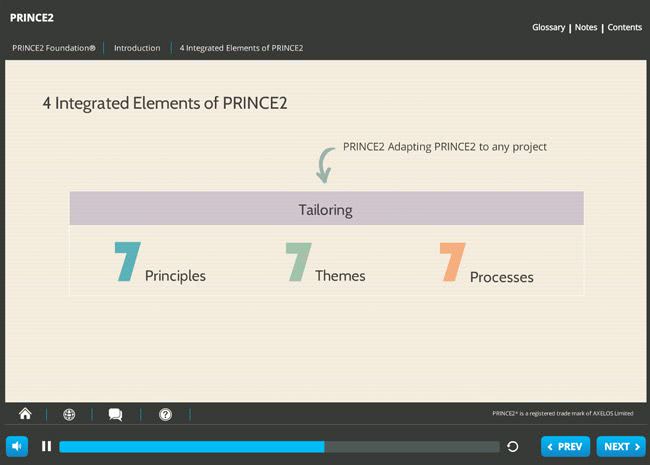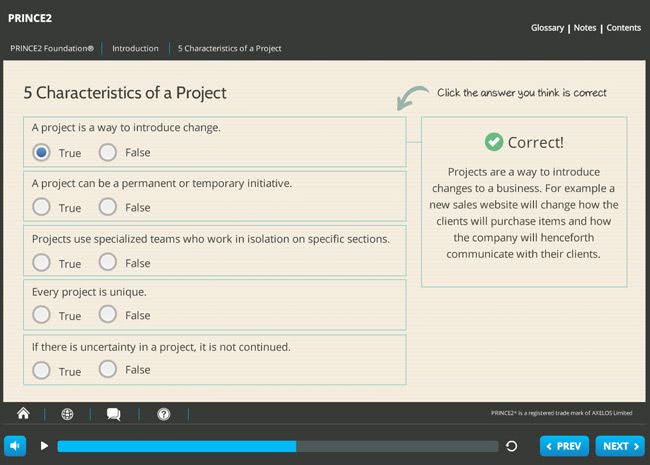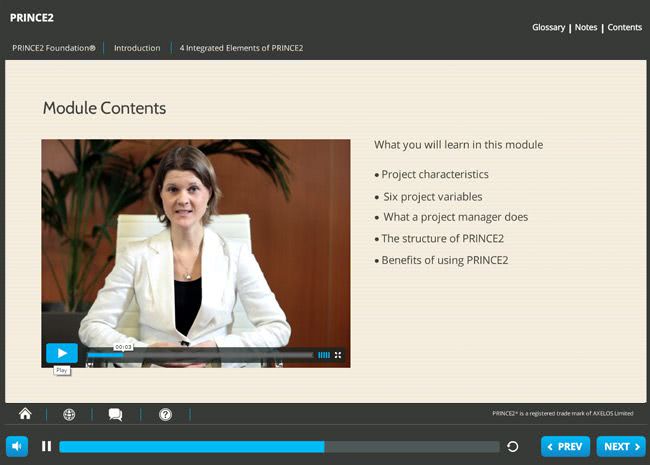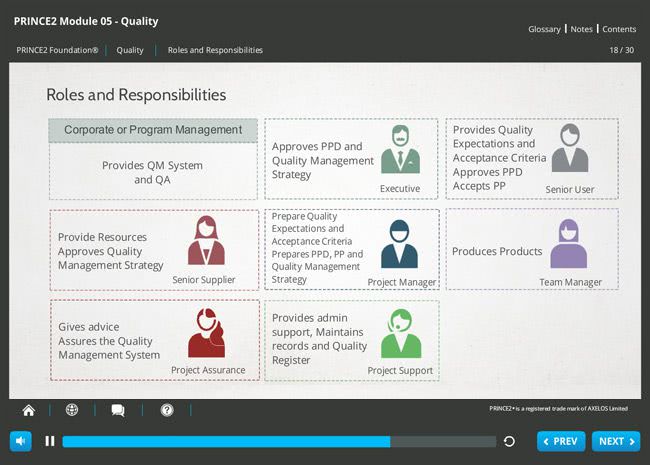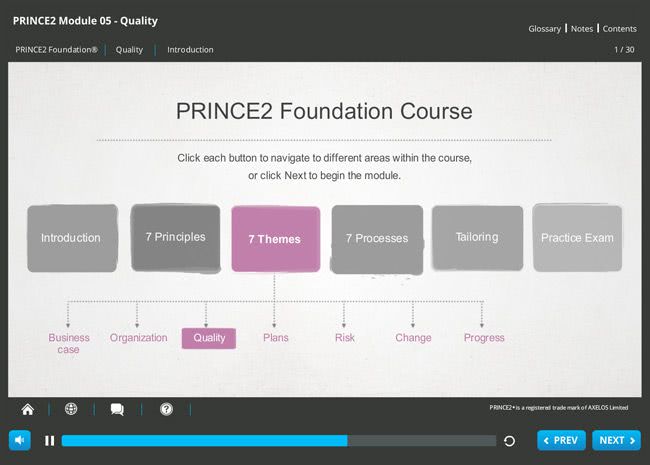Project Management:
PRINCE2® 6th Edition Foundation & Practitioner
12 months e-learning + exam voucher
€1.429 + VAT
“Project Manager
is a person who believes
nine women can deliver a baby
in one month.”
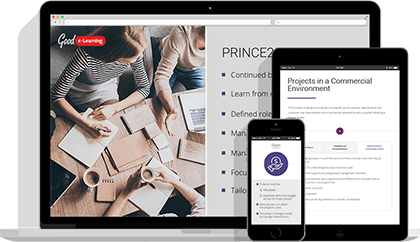
€789.00Add to cart
€789.00Add to cart
Project Management:
PRINCE2® 6th Edition Foundation & Practitioner
E-learning + Web-based examination
€789.00Add to cart
Key information about this course:
Price: 1.429 € + VAT ( 12 month E-learning + Exam Vouchers)
- 25+ hours of course material included
- Fully accredited training course
- Expert tutor support
- Fully mobile compatible
- 12 months access – start today!
- FREE Exam vouchers

This PRINCE2 Foundation & Practitioner course offers an excellent fast track to becoming a registered PRINCE2 practitioner and provides students with everything needed to prepare for, take and pass the PRINCE2 Foundation and PRINCE2 Practitioner examinations, including FREE exam vouchers.
Students will be introduced to the principles, processes, themes and project environments which make up PRINCE2, as well as the relationships between them. They will then learn how to adapt and apply the methodology in practical real-world scenarios.
Project management has become a highly valuable corporate discipline. Regardless of the location, industry or size of an organization, having an effective project management framework is essential for achieving crucial goals on time, within budget and with a strict focus on corporate priorities.
This course is ideal for anyone who wants to pass the PRINCE2 Foundation and Practitioner exams in quick succession in order to become a fully qualified PRINCE2 Practitioner. Many students prefer this combined approach, as it means less time and money spent on training.
When it comes to project management, very few frameworks are as widely used as PRINCE2. This course offers students everything they need to become certified PRINCE2 practitioners, including practice exams, 24/7 support and expert content written by our in-house team of specialists.
There is no prerequisite for taking this course. However, students cannot take the PRINCE2 Practitioner examination without first obtaining a PRINCE2 Foundation certificate (or Project Management Professional (PMP), Certified Associate in Project Management (CAPM), or IPMA Level A, B, C or D).
- The key concepts and principles of the PRINCE2 project management methodology
- The purpose and content of the processes, principles, themes and project environments that make up PRINCE2, as well as the relationships between them
- How PRINCE2 can be tailored to fit projects varying in size, industry, location and so on
- The purpose and content of the processes, principles, themes and project environments that make up PRINCE2, as well as the relationships between them
- How to apply the PRINCE2 principles in practice
- The confidence to be able to take on leading roles in project management teams within PRINCE2 environments
- Everything needed to pass the official PRINCE2 Foundation and PRINCE2 Practitioner exams
Course Syllabus
- Introduction to PRINCE2
- Breakdown of the course
- Lesson plan
- Benefits of this course
- Benefits of PRINCE2
By the end of the module, students should be able to recall the integrated elements of PRINCE2, including:
- Principles
- Themes
- Processes
- The Project Environment
- The definitions and characteristics of a ‘project’
- The 6 aspects of project performance to be managed
- What makes a project a ‘PRINCE2 project’
Students should also be able to describe the customer/supplier context on which PRINCE2 is based, including which considerations to take into account when undertaking projects in a commercial environment.
- Continued Business Justification
- Learn from Experience
- Defined Roles and Responsibilities
- Manage by Stages
- Manage by Exception
- Focus on Products
- Tailor to Suit the Project
By the end of the module, students should be able to recall and explain the purpose of each Principle.
- Starting up a Project (including the purpose of the ‘project brief’)
- Directing a Project (including the purpose of the ‘project initiation documentation (PID)’)
- Initiating a Project
- Controlling a Stage
- Managing Product Delivery
- Managing a Stage Boundary
- Closing a Project
Business Case – Students will be able to explain the purpose of the ‘Business Case’ Theme, including businesses cases and the benefits management approach. They should also be capable of describing PRINCE2’s minimum requirements for applying the Business Case Theme.
Finally, they will be able to define the key concepts related to business justification, as well as the differences between them, including:
- Outputs
- Outcomes
- Benefits
- Dis-benefits
Organization – Students will come to understand the purpose of the ‘Organization’ Theme, as well as the communication management approach. By the end of the section, students should be able to describe what PRINCE2 requires, as a minimum, for applying the Organization Theme.
They will also know the roles and responsibilities for the Theme (some of which may be combined), including:
- Project board
- Executive
- Senior user
- Senior supplier
- Project assurance
- Change authority
- Project manager
- Team manager
- Project support
Finally, students should be able to explain the key concepts related to the Organization Theme, including the Stakeholder and the three ‘Project Interests’ (and how they are represented within the four levels of management).
Quality – Students will be able to explain the purpose and contents of the ‘Quality’ Theme, including:
- The product description
- The project product description
- The quality management approach
- The quality register
By the end of the section, students will be able to describe PRINCE2’s minimum requirements for applying the Quality Theme. They will also be capable of explaining the key concepts related to Quality, along with the differences between them:
- Quality planning and quality control
- Project assurance and quality assurance
- Customer quality expectations and acceptance criteria
Plans – Students will be able to explain the purpose and contents of the ‘Plans’ Theme, including:
- The project plan
- The stage plan
- The exception plan
- The team plan
By the end of this section, students should be able to describe PRINCE2’s minimum requirements for applying the Plans Theme. Students will also be able to recall the steps described in the recommended approaches for planning, defining and analyzing products. Finally, students should be able to explain which factors to consider when structuring a project into management stages.
Risk – Students will be able to explain the purpose and contents of the ‘Risk’ Theme, as well as:
- A risk budget
- The risk management approach
- A risk register
By the end of this section, students will be able to describe PRINCE2’s minimum requirements for applying the Theme, as well as PRINCE2’s recommended risk management procedure. They will also be able to define the key concepts related to Risk, as well as the differences between them:
- Risks as ‘Threats’ or ‘Opportunities’
- Recommended risk response types
- Risk owners
- Risk actionees
- Causes, events and effects
- Risk probability
- Risk impact
- Risk proximity
Change – Students will learn to explain the purpose of the ‘Change’ Theme, including the purpose of:
- Change budget
- Change control approach
- Configuration item record
- Issue register
- Issue report
- Product status account
By the end of the section, students will be able to describe PRINCE2’s minimum requirements for applying the Change Theme. They will also be able to describe the types of issues associated with the Theme, as well as the recommended issue and change control procedure.
Progress – Students will be able to explain the purpose of the ‘Progress’ Theme, as well as:
- The daily log
- Lessons log
- Lessons report
- Work package
- End-stage report
- End project report
- Checkpoint report
- Highlight report
- Exception report
By the end of the section, students will be able to describe PRINCE2’s minimum requirements for applying the Progress Theme. They will also be able to explain key concepts relating to Progress, including:
- Event-driven and time-driven controls
- Tolerances and exceptions (including how tolerances are set and exceptions are reported)
This module looks at the PRINCE2 practice of ‘Tailoring’. Students will learn about:
- Which aspects of a project can be tailored
- Who is responsible
- How tailoring decisions are documented
Here, we offer students the chance to put into practice what they have learned so far. These exams are designed to simulate the official PRINCE2 Foundation examination and offer students the questions with rationale to review the key points covered.
When you feel you are ready to sit the exam, simply contact Good e-Learning to request your FREE exam voucher.
Here, we offer students the chance to put into practice what they have learned so far. These exams are designed to simulate the official PRINCE2 Foundation examination and offer students the questions with rationale to review the key points covered.
When you feel you are ready to sit the exam, simply contact Good e-Learning to request your FREE exam voucher.
This module provides an introduction to the PRINCE2 Practitioner course. The aims and objectives of the course will be covered, and a navigation video will be provided to help students understand what they can expect from the rest of the course.
- Introduction to PRINCE2 Practitioner
- Breakdown of the course
- Lesson plan
- Benefits of this course
This module will address the Principles of PRINCE2 and how they are applied. By the end of the module, students will be expected to be able to analyze the application of PRINCE2 Principles in different contexts.
The ‘Business Case’ Theme forms an important part of any PRINCE2 project. In this module, students will learn the requirements of the Business Case Theme. By the end, they will be expected to demonstrate their understanding of:
- Key management products (the business case and the correct approach to benefits management)
- The recommended roles and responsibilities defined in the Theme
- The outputs, outcomes, benefits and dis-benefits
As a result of this understanding, students will be able to assess whether a given approach to applying the Business Case Theme is effective and fit for purpose, based on:
- The context
- The PRINCE2 Principles
- Defined Roles and Responsibilities
- The purpose and requirements of the Theme
This module focuses on the PRINCE2 Theme of ‘Organization’. Students will be expected to demonstrate their understanding of:
- The key management products (of the communication management approach)
- The recommended roles and responsibilities within the Theme
- The recommended project management team structure
They will also be expected to be able to effectively assess whether an approach to applying the Organization Theme is effective and fit for purpose, based on:
- The context
- The PRINCE2 Principles
- The purpose and requirements of the Theme
This module deals with the Theme of ‘Quality’. Students will be expected to demonstrate their understanding of:
- Key management products, including the product description, project product description, quality management approach and quality register
- The recommended roles and responsibilities within the Theme
- The key activities of quality planning, quality control and quality assurance
Students will also be expected to be able to assess whether an approach to applying the Quality Theme is effective and fit for purpose, based on:
- The context
- The PRINCE2 Principles
- The purpose and requirements of the Theme
This module deals with the ‘Plans’ Theme. Students will be expected to demonstrate their understanding of:
- The key management products, including the project plan, stage plan, exception plan and team plan
- The recommended roles and responsibilities within the Theme
- The recommended approach to planning, including the recommended approach for defining and analyzing the products
Based on their understanding of the Plans Theme, students will also learn to assess whether an approach to applying it is effective and fit for purpose, based on:
- The context
- The PRINCE2 Principles
- The purpose and requirements of the Theme
This module looks at the requirements for applying the ‘Risk’ Theme. Students will be expected to be able to demonstrate their understanding of:
- The key management products, including the risk management approach and risk register
- The recommended roles and responsibilities within the Theme
- The recommended risk management procedure
With their understanding of the Risk Theme, students should also be able to assess whether an approach to applying it is effective and fit for purpose, based on:
- The context
- The PRINCE2 Principles
- The purpose and requirements of the Theme
This module will cover the ‘Change’ Theme. Students will be expected to be able to demonstrate their understanding of:
- The key management products, including the change control approach, the configuration item record, the issue register, the issue report and the product status account
- The recommended roles and responsibilities within the Theme
- The recommended issue and change control procedure, including types of issue
Based on their understanding of the Change Theme, students should also be able to assess whether an approach to applying it is effective and fit for purpose, taking into account:
- The context
- The PRINCE2 Principles
- The purpose and requirements of the Theme
This module looks at the ‘Progress’ Theme. Students will come to understand how to follow the PRINCE2 requirements for controlling Progress, demonstrating their understanding of:
- Key management products, including the checkpoint report, daily log, end project report, end-stage report, exception report, highlight report, lessons log and work package
- The recommended roles and responsibilities of the Progress Theme
- Tolerances and raising exceptions
Students should also be able to use their knowledge of the Theme to assess whether a particular case of applying it is effective and fit for purpose, based on:
- The context
- The PRINCE2 Principles
- The purpose and requirements of the Theme
This module covers the PRINCE2 Process Model. Students will be expected to be able to recall the fundamentals of the Process Model, including how the seven PRINCE2 Processes interact in practice.
This module covers the Process of ‘Starting Up a Project (SU)’ and the associated activities. This will include a number of associated actions, including:
- Appoint the executive and the project manager
- Capture previous lessons
- Design and appoint the project management team
- Prepare the outline business case
- Select the project approach and assemble the project brief
- Plan the initiation management stage, demonstrating an understanding of the recommended roles and responsibilities within the Process, as well as how the Themes may be applied
This module covers the ‘Directing a Project (DP)’ Process. Students will learn how to carry out the Process, as well as the associated actions:
- Authorize initiation
- Authorize the project
- Authorize a stage or exception plan
- Give ad hoc direction
- Authorize project closure, demonstrating an understanding of the recommended roles and responsibilities within the Process, as well as how the PRINCE2 Themes may be applied
By the end of the module, students should be able to assess whether the activities, actions, roles and responsibilities associated with the Directing a Project Process are effective and fit for purpose for a given case, based on:
- The context
- The PRINCE2 Principles
- The purpose and objectives of the Process
The module looks at the PRINCE2 Process of ‘Initiating a Project (IP)’. Students will learn to carry out the associated Process activities and actions, including:
- Agreeing on the tailoring requirements
- Prepare the risk management approach
- Prepare the change control approach
- Prepare the quality management approach
- Prepare the communication management approach
- Set up the project controls
- Create the project plan
- Refine the business case
- Assemble the project initiation document (students should be able to demonstrate their understanding of the recommended roles and responsibilities within the Process, as well as how the Themes may be applied)
Students will be expected to be able to assess whether activities, actions, roles and responsibilities associated with the Initiating a Project Process are effective and fit for purpose for a given case. This should be based on:
- The context
- The PRINCE2 Principles
- The purpose and objectives of the Process
This module covers the Process of ‘Controlling a Stage (CS)’. Students will learn how to carry out the associated activities, including those relating to ‘Work packages’:
- Authorizing work packages
- Reviewing work package status
- Receiving completed work packages
The module will also cover monitoring and reporting activities, including:
- Reviewing the management stage status
- Reacting to report highlights, including issues
- Capturing and examining issues and risks
- Escalating issues and risks
- Taking corrective action and demonstrating an understanding of the recommended roles and responsibilities within the Process, as well as how the Themes may be applied
By the end of the module, students should be able to assess whether the activities, actions, roles and responsibilities associated with the Process of Controlling a Stage are effective and fit for purpose in a given case, taking into consideration:
- The context
- The PRINCE2 Principles
- The purpose and objectives of the Process
This module covers the Process of ‘Managing Product Delivery (MP)’. Students will develop an understanding of the process activities and associated actions, including:
- Accept a work package
- Execute a work package
- Deliver a work package, demonstrating an understanding of the recommended roles and responsibilities within the Process and how the themes may be applied
By the end of the module, students will be expected to be able to assess whether the activities, actions, roles and responsibilities associated with the Managing Product Delivery Process are effective and fit for purpose in a given case, based on:
- The context
- The PRINCE2 Principles
- The purpose and objectives of the Process
This module covers the Process of ‘Managing a Stage Boundary (SB)’. Students will learn to carry out the Process activities and recommended associated actions, including:
- Plan the next management stage
- Update the project plan
- Update the business case
- Report management stage end
- Produce an exception plan, demonstrating an understanding of the recommended roles and responsibilities within the Process, as well as how the Themes may be applied
By the end of the module, students should be able to assess whether the activities, actions, roles and responsibilities associated with the Managing a Stage Boundary Process are effective and fit for purpose in any given case, based on:
- The context
- The PRINCE2 Principles
- The purpose and objectives of the Process
This module covers the Process of ‘Closing a Project (CP)’. Students will learn to carry out the Process activities and recommended associated actions, including:
- Prepare planned closure
- Prepare premature closure
- Hand over products
- Evaluate the project
- Recommend project closure, demonstrating an understanding of the recommended roles and responsibilities within the Process, as well as how the Themes may be applied
By the end of the module, students should be able to assess whether the activities, actions, roles and responsibilities associated with the Closing a Project Process are effective and fit for purpose in a given case, based on:
- The context
- The PRINCE2 Principles
- The purpose and objectives of the Process
Here, we offer students the chance to put into practice what they have learned so far. These exams are designed to simulate the official PRINCE2 Practitioner examination and offer students the questions with rationale to review the key points covered.
When you feel you are ready to sit the exam, simply contact Good e-Learning to request your FREE exam voucher.
Exams / Assessments
This course is designed to fully prepare candidates to sit both the PRINCE2 Foundation and PRINCE2 Practitioner examinations.
You can take the exam online (virtually) using a service provided by PeopleCert.
Both the Foundation and Practitioner sections of the course feature mock exams to help candidates prepare for the real thing. Once you feel you are ready to sit an exam, please contact us to request a FREE exam voucher. Candidates can receive one free voucher per-exam.
Before booking your exam, it will be a good idea to make sure that your device meets the technical requirements. You can do so via this online test. This test will examine the suitability of your webcam, microphone and internet connection. Please visit the PeopleCert website for more information and guidance.
- PRINCE2 Foundation (or higher). This applies only to certificates obtained after 1 January 2009
- Project Management Professional (PMP)
- Certified Associate in Project Management (CAPM)
- IPMA Level A® (Certified Projects Director)
- IPMA Level B® (Certified Senior Project Manager)
- IPMA Level C® (Certified Project Manager)
- IPMA Level D® (Certified Project Management Associate)
- Closed book
- All questions are multiple choice
- There are 60 questions per paper (each worth one mark)
- 33 marks are required to pass (55%)
- Candidates will have one hour (60 minutes) to complete the exam
- Objective testing
- All questions are multiple choice
- Open book (only official hard copies of the Managing Successful Projects with PRINCE2® 6th Edition will be allowed. Printed PDF copies and digital copies stored on electronic devices will not be permitted in exam environments)
- Students may use annotated or tabulated hard copies in the exam. However, these copies may not contain additional loose papers or notes
- There are 68 questions per paper (each worth one mark)
- 38 marks are required to pass (55%)
- Candidates will have two and a half hours (150 minutes) to complete the exam, with no additional reading time
Accredited PRINCE2® 6th Edition Foundation & Practitioner training is provided by Good e-learning, accredited by PeopleCert.

